Even as the Dow Jones Industrial Average hits 12,000 for the first time in 2 1/2 years, market pros are advising caution in using that as a reason to jump into stocks.
"Most won't invest just because the Dow is approaching the 12,000 mark," says Beth Larson, principal at Evermay Wealth Management in Washington, D.C. "I would hope that not too many individual investors are getting in at this level."
It's not just the Dow industrials that are hitting a milestone. The Standard & Poor's 500, which is better barometer of the overall market, is approaching 1,300. The tech-heavy Nasdaq also is trading higher.
Both the Dow and S&P marks hold little significance in terms of technical support or resistance levels in the current market, but they do make attractive headline numbers that could tempt investors to come off the sidelines.
That could be a mistake, particularly as the market by some measures is well into overbought status and overdue for at least a modest pullback.
Domestic equity mutual funds showed inflows of $3.76 billion for the week ended Jan. 12, according to the Investment Company Institute, indicating that retail investors were re-entering the market.
Crossing psychological barriers hasn't always been an accurate way to judge market movements. When the market recovered and shot past 10,000 again in November 2009, it was a quick but bumpy ride up to 11,000 in April 2010.
But the market swooned from there before rebounding after the Federal Reserve launched the second leg of its monetary easing program, and voters changed the complexion in Washington by restoring a Republican majority in the House.
Should the news cycle turn negative, as it did after Dow 11,000, investors could be in for some significant volatility.
"If our sense of reading the market tea leaves is remotely accurate, it may be necessary for some action on long-term deficit reduction that is credible to the investment community for a new secular bull market to evolve," Tobias Levkovich, Citigroup's chief market strategist, said in a note to clients.
The touchy political climatehas some investors concerned, regardless of whether the January Effect, which prior to the past two years had correctly predicted the market about 90 percent of the time, proves accurate.
"Everybody seems to be of the same mind now. It's hard to find someone who is not at least moderately bullish. You get everybody lined up on one side of the market and it has a habit of doing the opposite," says David Twibell, president of wealth management for Colorado Capital Bank in Denver. "We are being selective here. The market has had a wonderful run. It may continue but at some point we're going to have a correction."
Twibell is buying stocks that have not participated in the rally, such as Hewlett-Packard , Intel and Cisco.
David Woo, forex and rates strategist for Bank of America Merrill Lynch Woo, is advising clients to hedge positions in foreign currencies such as the Swedish krona and the Korean won as a brace should the "long equities" trade start to become too crowded and falter.



